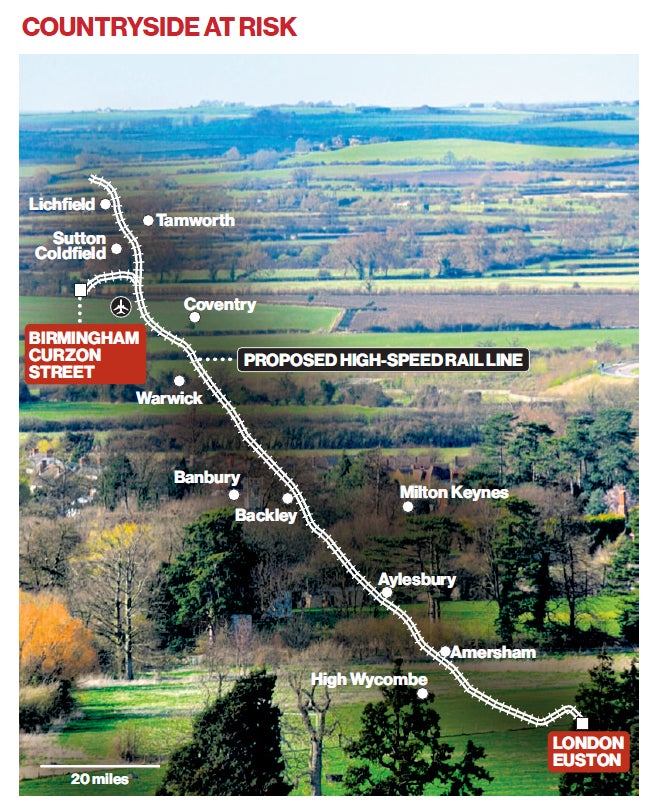Full steam ahead for high-speed rail
PM risks confrontation with MPs after backing new link between London and Birmingham

Your support helps us to tell the story
From reproductive rights to climate change to Big Tech, The Independent is on the ground when the story is developing. Whether it's investigating the financials of Elon Musk's pro-Trump PAC or producing our latest documentary, 'The A Word', which shines a light on the American women fighting for reproductive rights, we know how important it is to parse out the facts from the messaging.
At such a critical moment in US history, we need reporters on the ground. Your donation allows us to keep sending journalists to speak to both sides of the story.
The Independent is trusted by Americans across the entire political spectrum. And unlike many other quality news outlets, we choose not to lock Americans out of our reporting and analysis with paywalls. We believe quality journalism should be available to everyone, paid for by those who can afford it.
Your support makes all the difference.A £32bn high-speed rail link between London and Birmingham that would cut through some of Britain's most prized countryside and infuriate Conservative MPs is set to be approved by the Transport Secretary.
Justine Greening's decision comes after a study of the alternatives concluded they would fail to reduce overcrowding on trains and would condemn passengers to years of engineering work and delays.
She is expected to confirm within days that the Government is pressing ahead with the scheme despite entrenched opposition among MPs and councils in the Home Counties to the route, which slices through the Chilterns.
Under the plans, the first stage of the HS2 route would be built by 2026, cutting travel times between London and Birmingham to 49 minutes – 23 minutes less than the current quickest journey.
Spurs to the North-west and Yorkshire would be built by 2032-33 in the second phase of the scheme, eventually bringing Manchester and Leeds within 80 minutes of the capital.
Opponents, including 18 local authorities, have argued that the Government has not made the business case for the project and warned that it will cause severe environment damage. They have called for the existing West Coast Main Line to be upgraded to provide extra capacity for passengers and set out two detailed proposals for how that could be achieved.
But, in a severe setback for the campaigners, the Department for Transport (DfT) last night disclosed that an analysis by Network Rail of the proposed alternatives has concluded they are deeply flawed. Ms Greening is understood to share its conclusions and to be planning to announce her decision soon after the Commons returns from its Christmas break on Tuesday.
A DfT source said Network Rail had conducted a "sober and independent analysis" of the alternatives to HS2 and concluded that "patchwork upgrades to the existing rail network simply will not resolve the huge capacity challenges we face". The source added: "Our plans for a new high-speed rail network would increase hugely the number of seats for passengers available on Britain's inter-city railways, as well as freeing up space on railways for more trains to operate – and all with minimal disruption to the existing railway."
Ms Greening had given fresh hope to HS2's critics when she ordered a fresh look at the scheme after becoming Transport Secretary in October. Her predecessor, Philip Hammond, was an enthusiastic advocate of the project, describing its opponents as "mainly nimbys".
Ms Greening's decision will infuriate many Tory MPs, including other ministers. Opponents of HS2 include Cheryl Gillan, the Welsh Secretary, Dominic Grieve, the Attorney General, and David Lidington, the Europe minister, as well as the Speaker, John Bercow. Some of Ms Gillan's colleagues believe she may resign in protest. By contrast Tory MPs and civic leaders in the North of England have argued it is essential for stimulating growth.
Ms Greening could try to sweeten the pill by offering fresh modifications to the route. She is considering spending £500m to build a 1.5-mile tunnel under the Chilterns in Buckinghamshire.
The conclusions emerged as the Government faced renewed calls to press ahead with the link in letters from economists, business leaders and union chiefs. The economists argued the project would help to create up to one million jobs and give a boost to the building industry.
Martin Tett, the chairman of 51m, an alliance of 18 local authorities opposed to HS2, said: "We're absolutely confident our proposals would meet all of the capacity requirements with minimal disruption much earlier than HS2 would and at a far lower cost."
Join our commenting forum
Join thought-provoking conversations, follow other Independent readers and see their replies
Comments